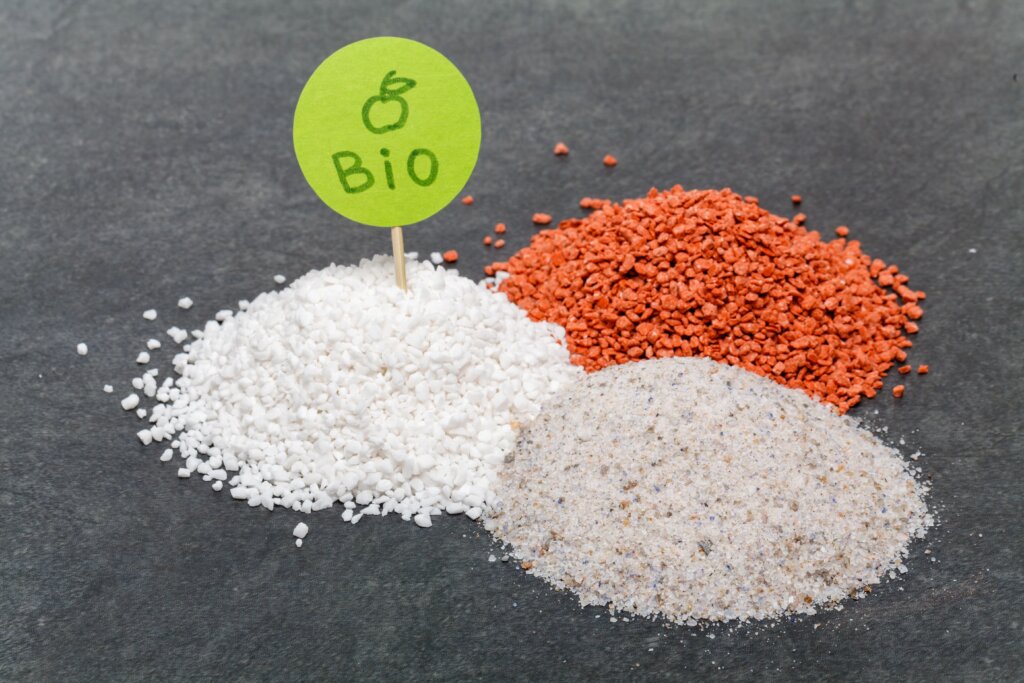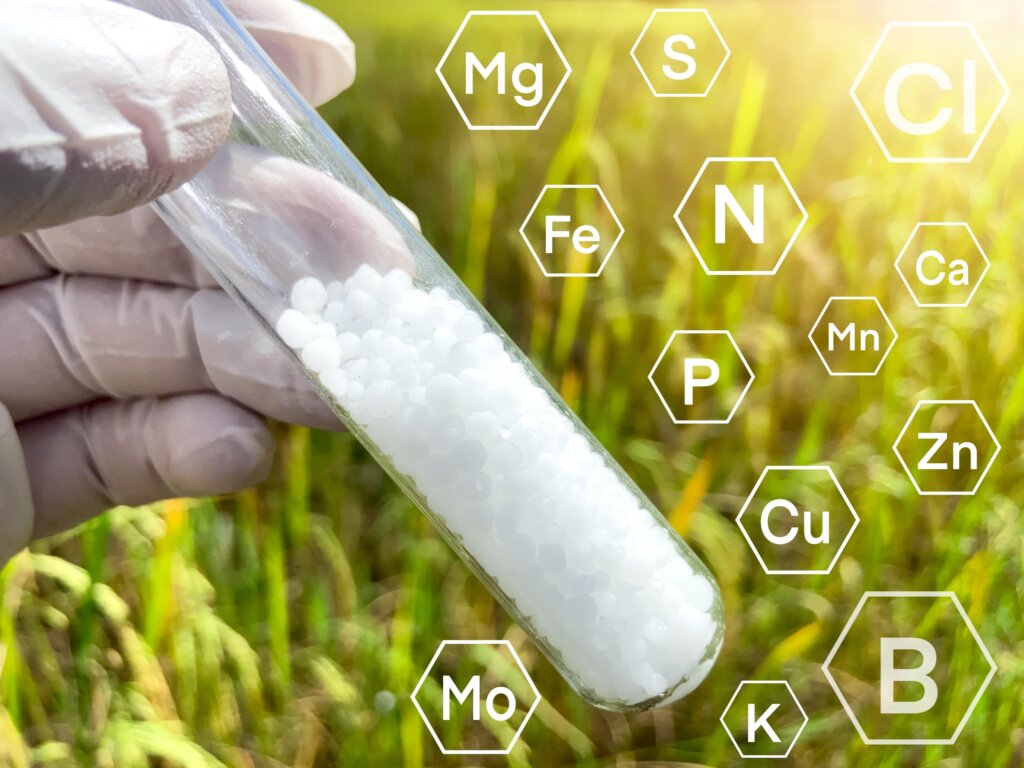A lush, resilient lawn starts with the right balance of nutrients. Discover how nitrogen, phosphorus, and potassium work together to keep your Pennsylvania turf healthy, green, and strong all year round.
Key Takeaways
- Fertilizer numbers like 10-10-10 and 15-15-15 show how nitrogen, phosphorus, and potassium work together for healthy, strong turf.
- Nitrogen fuels green growth, while slow-release types keep roots steady.
- Phosphorus builds deep roots and reduces runoff.
- Potassium boosts drought and disease resistance and keeps nutrients balanced.
- Balanced fertilization prevents salt stress and keeps potassium levels in check, just like a healthy diet supports overall wellness.
- Terra Lawn Care uses expert soil testing and blends like potassium chloride and potassium citrate to keep Pennsylvania lawns thriving.
Understanding the N-P-K Ratio

Every fertilizer label lists three key numbers—like 10-10-10 or 15-15-15—representing nitrogen (N), phosphorus (P), and potassium (K). These nutrients directly influence turfgrass growth, root strength, and resistance to stressors like drought or disease. Much like dietary reference intakes guide human nutrition, understanding your fertilizer numbers helps ensure balanced nutrient levels without adding excess amounts that can disrupt soil health.
The Balanced Blend: 10-10-10 Fertilizer
A 10-10-10 fertilizer provides equal parts of nitrogen, phosphorus, and potassium. essential for maintaining the normal range of potassium levels in your lawn. This mix supports vibrant color, dense turf, and overall resilience. Similar to dietary supplements that promote bone health and regulate blood pressure, this fertilizer keeps your lawn nourished and balanced through steady nutrient release.
The Vigorous Feed: 15-15-15 Fertilizer
For mature or heavily used lawns, a 15-15-15 fertilizer offers a stronger nutrient profile. It helps plants manage potassium excretion efficiently, strengthening roots and enhancing nutrient absorption through the soil’s “digestive” system.
Like potassium supplements that benefit the human heart and cell membranes, this mix protects your grass from severe deficiency or too much potassium. Both of which can affect plant performance and increase cardiovascular risk equivalents in plant health.
Keeping Nutrients in Balance
Both blends maintain a healthy soil ecosystem by preventing mineral buildup and supporting consistent potassium helps functions within plant cells. Used correctly, they act as the plant equivalent of a diet rich in leafy greens, fueling strong roots and steady growth.
Learn more about identifying and correcting nutrient imbalances through Terra’s Nutrient Deficiencies in Plants Guide.
Comparing Common Fertilizer Ratios
Choosing the right fertilizer numbers helps balance nitrogen, phosphorus, and potassium for optimal turf health and growth.
| Fertilizer Type | N-P-K Ratio | Best For |
|---|---|---|
| 10-10-10 Fertilizer | 10-10-10 | Balanced nutrition for routine lawn maintenance |
| 15-15-15 Fertilizer | 15-15-15 | Boosting vigor and supporting established lawns |
| Grass Fertilizer 20-10-10 | 20-10-10 | Rapid nitrogen boost and quick green-up |
| Phosphorus-Free Mix | 20-0-20 | Reducing runoff in regulated Pennsylvania areas |
Maintaining proper N-P-K ratios prevents nutrient deficiencies in plants and minimizes stress-related risks, ensuring strong, resilient turf.
The Science Behind Balanced Fertilization

When combined properly, nitrogen, phosphorus, and potassium create a self-sustaining nutrient ecosystem:
- Nitrogen enhances blade density and chlorophyll production.
- Phosphorus strengthens roots and improves nutrient absorption.
- Potassium increases durability and environmental stress resistance.
Overuse or excess amounts of any nutrient can lead to environmental runoff or increased risk of soil salinity. Terra Lawn Care’s certified agronomists apply scientific precision—considering chemical technology, weather data, and other factors—to ensure balanced fertilizer applications for every Pennsylvania property.
Nitrogen: The Foundation of Green Growth
Nitrogen provides the nitrogen molecule essential for chlorophyll production and rapid leaf development. This element is the core driver of amino acids, proteins, and healthy turf color.
However, excess nitrogen can lead to harmful effects such as overstimulated top growth and weaker roots. Pennsylvania’s clay-heavy soils, influenced by local chemical physics and moisture levels, require slow-release nitrogen formulations, something Terra Lawn Care manages expertly to maintain consistent growth and soil integrity.
Phosphorus: Strong Roots and Early Development
Phosphorus supports early root establishment and internal energy transfer, comparable to how phosphorus aids bone health and metabolism in humans.
Pennsylvania has strict environmental standards to reduce phosphate content in runoff, making professional handling critical. Terra’s agronomists use soil data and clinical trials-based science to determine the right recommended dietary allowance of phosphorus for every lawn.
Potassium: The Unsung Hero of Lawn Resilience
Potassium (chemical symbol K) plays a vital role in your lawn’s health and resilience. It strengthens plant cell membranes, regulates water balance in the soil’s root zone, and enhances turf’s resistance to temperature extremes, drought, and disease.
Research from the National Institutes of Health (NIH) shows that potassium helps regulate enzyme activity and nutrient transport in plants, much like how it supports normal kidney function in humans.
Key Functions of Potassium in Turf
- Regulates potassium levels in the root zone and supports steady nutrient intake, much like how potassium-sparing diuretics balance fluid in the human body.
- Prevents potassium deficiency symptoms, such as yellowing leaf edges, weak roots, and poor recovery after drought or stress, conditions that parallel electrolyte imbalance in humans.
- Enhances uptake of calcium and magnesium, maintaining balance among other nutrients and mitigating soil salt stress from table salt or sodium chloride exposure.
- Improves structural integrity, offering turf a strength comparable to bone health in humans, ensuring resilience against heavy traffic and extreme weather.
How Professionals Address Potassium in Pennsylvania Lawns
To ensure healthy plant growth across Pennsylvania’s diverse soils, Terra Lawn Care experts rely on scientific calibration and results from soil chemistry analyses akin to those found in the Journal of Chemical Education and American Chemical Society studies. Professional strategies include:
- Potassium chloride (KCl): A standard fertilizer with a known boiling point and high solubility, ideal when soils show low potassium concentrations or depleted K reserves.
- Potassium citrate: Used when turf requires gentler, low-chloride supplementation, helping to prevent high concentrations of salts that could mimic kidney stones–like mineral buildup in soil.
- Routine soil testing: Similar to health fact sheets from the National Academies Press, regular monitoring ensures potassium levels stay optimal, avoiding both deficiency and excess that might harm turf systems.
- Expert application guidance: Terra’s licensed technicians apply nutrients precisely, preventing overuse that could interfere with calcium, magnesium, or other essential components in your lawn’s ecosystem.
For customized fertilization designed around your soil composition and turf needs in Pennsylvania, talk with the certified professionals at Terra Lawn Care about specialized programs built for local conditions.
Why Potassium Is Crucial for Pennsylvania Lawns
- Improves climate resilience: Enhances drought, heat, and cold tolerance, critical for Pennsylvania’s seasonal shifts and fluctuating rainfall patterns.
- Boosts recovery and stress resistance: Strengthens cell walls and roots, allowing faster rebound after disease, compaction, or heavy foot traffic—comparable to how a diet rich in potassium supports recovery in healthy people.
- Maintains nutrient balance: Prevents interference between nitrogen, phosphorus, and potassium ratios, ensuring a healthy “circulatory system” for your turf and avoiding life-threatening nutrient stress to the lawn ecosystem.
Latest research confirms that potassium fertiliser is most effective when used in combination with nitrogen and phosphorus, highlighting the importance of a balanced N-P-K program.
Your Local Lawn Care Experts in Pennsylvania
Locally owned and family-operated since 2003, Terra Lawn Care has delivered results rooted in science and sustainability. Our team—licensed in PA, NJ, and DE—uses data-driven fertilizer programs, ensuring adequate intake of all major nutrients.
With a 95% client retention rate and a certified in-house agronomist, Terra’s approach minimizes severe hypokalemia-like deficiencies in soil nutrients while supporting bone health in plants through balanced fertilizer management. Explore our service area for a personalized consultation on the right N-P-K balance for your lawn.
Ready to strengthen your lawn’s health from the roots up?
Mastering the balance of nitrogen, phosphorus, and potassium is the cornerstone of healthy lawn management. Each nutrient works in synergy to ensure deep roots, rich color, and year-round resilience.
Partnering with Terra Lawn Care gives Pennsylvania homeowners access to agronomic expertise backed by the National Institute of Scientific potassium deficiency, applying potassium supplements, or optimizing dietary supplements for soil, Terra ensures every lawn thrives under expert care. Schedule professional lawn fertilization services today.
Frequently Asked Questions About Nitrogen, Phosphorus, and Potassium Lawn Fertilizer
Potassium is essential for strengthening plant cell walls, regulating water use, and supporting nutrient transport in the root zone. Adequate potassium levels improve bone metabolism-like structural strength in turf and help lawns withstand drought, temperature swings, and disease.
Similar to how blood pressure and normal kidney function rely on proper potassium balance in humans, lawns depend on steady potassium uptake from food sources in the soil, ensuring resilience and sustained growth.
Signs of low potassium include yellowing leaf edges, weak roots, slow recovery after stress, and poor resistance to disease. Soil testing measures potassium intake and identifies whether potassium supplements such as potassium chloride or potassium citrate are needed.
Proper supplementation restores balance, prevents high potassium imbalances, and supports nutrient absorption similar to animal proteins and other components in human nutrition. Maintaining healthy potassium levels is like providing extra potassium from food sources or supplement forms for sustained lawn vigor.
Yes, excessive potassium can interfere with the uptake of other essential nutrients like calcium and magnesium, potentially creating life-threatening imbalances in turf. High potassium levels in soil can lead to nutrient competition, similar to how excess potassium in humans may affect blood pressure or contribute to kidney disease.
Professional guidance ensures correct application rates, preventing excess amounts from harming turf and maintaining overall lawn health. Using potassium properly avoids stress comparable to issues caused by processed foods or processed meat in human diets.
Frequency depends on your lawn’s soil composition and growth needs. Nitrogen fuels blade growth, phosphorus strengthens roots, and potassium enhances stress tolerance. Experts often recommend soil testing to determine nutrient levels before applying fertilizers, similar to how health professionals recommend monitoring potassium levels in humans for safety and efficiency.
Yes. Organic amendments and composted other legumes or leafy greens can increase soil potassium. These sources act similarly to dietary supplements in humans, helping maintain steady potassium intake while supporting overall plant growth and soil health without chemical overload.
Potassium can be safely combined with nitrogen and phosphorus when applied at the correct rates. Professional guidance ensures that it does not interfere with other nutrients or create severe cases of deficiency or excess. Terra Lawn Care technicians monitor potassium excretion in the soil, preventing high concentrations that could harm turf or neighboring plants.



